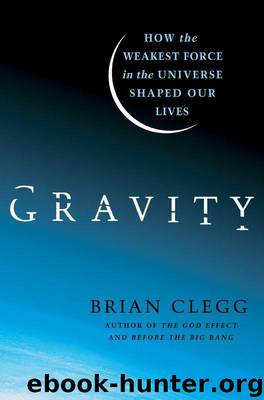Gravity: How the Weakest Force in the Universe Shaped Our Lives by Clegg Brian

Author:Clegg, Brian [Clegg, Brian]
Language: eng
Format: mobi, epub
Publisher: St. Martin's Press
Published: 2012-05-21T22:00:00+00:00
CHAPTER EIGHT
ONE OF FOUR
It will be found that everything depends on the composition of the forces with which the particles of matter act upon one another; and from these forces, as a matter of fact, all phenomena of nature take their origin.
—Philosophiae Naturalis Theoria (1758)
Roger Joseph Boscovich
Gravity, as the medieval philosophers were aware, is not alone as a force in the universe. They also knew about the magnetic and electrical effects produced by the electromagnetic force. For a long time there was a suspicion that gravity and magnetism were just variants on a theme. Admittedly, magnetism has some significant differences. Not all objects are influenced by magnetism, while all are by gravity. Gravity always appears to be attractive, while magnetism can be attractive or repulsive, but both appeared to involve a mysterious interaction at a distance.
Early attempts to explain the nature of gravity often put it down to some special kind of magnetism. The possibility of a connection was still in the air in the nineteenth century when the great English physicist Michael Faraday was at work at the Royal Institution in London. In 1849, Faraday wrote in his notebook: “Gravity. Surely this force must be capable of an experimental relation to electricity, magnetism, and other forces…”
Faraday went on to undertake experiment after experiment to try to discover some kind of relationship between the two forces. He knew, as he had proved, it was possible to make magnetism from electricity and electricity from magnetism. Why not gravity from electricity or magnetism from gravity? But unlike his many successes with electromagnetism, he could not get gravity to play ball. In the end he had to conclude, “Here end my trials at present. The results are negative. They do not shake my strong feeling of the existence of a relationship between gravity and electricity, though they give no proof that such a relation exists.”1
As we will discover, gravity and electromagnetism proved not to be the only forces responsible for actions in the universe, but the urge to find some linkage between these fundamentals that shape reality has not gone away. After his huge contributions to science in 1905 and the development of general relativity 10 years later, Einstein would spend many years looking for a mechanism to produce a “unified field theory” (we’ll come back to why it was a “unified field theory” rather than a “unified force theory”)—a search that proved fruitless. He would produce no more significant results after general relativity.
Faraday’s experimental genius and Einstein’s unparalleled grasp of theory both failed to find a link between gravity and the other forces. It seems that gravity stands alone. It might seem obvious, in that gravity has a very different mechanism if it is truly about warping space-time. In effect, gravity isn’t a force at all, but a side effect of this distortion. But Einstein hoped that he could find a similar warp-based explanation of electromagnetism, turning it, too, into an effect of space-time geometry. As yet there is no evidence that this is possible.
Download
Gravity: How the Weakest Force in the Universe Shaped Our Lives by Clegg Brian.epub
This site does not store any files on its server. We only index and link to content provided by other sites. Please contact the content providers to delete copyright contents if any and email us, we'll remove relevant links or contents immediately.
The Complete Stick Figure Physics Tutorials by Allen Sarah(6639)
Secrets of Antigravity Propulsion: Tesla, UFOs, and Classified Aerospace Technology by Ph.D. Paul A. Laviolette(3450)
Thing Explainer by Randall Munroe(3328)
The River of Consciousness by Oliver Sacks(2992)
The Order of Time by Carlo Rovelli(2714)
I Live in the Future & Here's How It Works by Nick Bilton(2525)
How To by Randall Munroe(2476)
A Brief History of Time by Stephen Hawking(2474)
The Great Unknown by Marcus du Sautoy(2186)
What If?: Serious Scientific Answers to Absurd Hypothetical Questions by Randall Munroe(2170)
Blockchain: Ultimate Step By Step Guide To Understanding Blockchain Technology, Bitcoin Creation, and the future of Money (Novice to Expert) by Keizer Söze(2138)
Midnight in Chernobyl by Adam Higginbotham(2079)
Networks: An Introduction by Newman Mark(1998)
The Meaning of it All by Richard Feynman(1909)
Easy Electronics by Charles Platt(1864)
The Tao of Physics by Fritjof Capra(1850)
When by Daniel H Pink(1777)
Midnight in Chernobyl: The Untold Story of the World's Greatest Nuclear Disaster by Adam Higginbotham(1775)
Introducing Relativity by Bruce Bassett(1755)
